Ekaterina Fadeeva
Don't Throw Away Your Beams: Improving Consistency-based Uncertainties in LLMs via Beam Search
Dec 10, 2025Abstract:Consistency-based methods have emerged as an effective approach to uncertainty quantification (UQ) in large language models. These methods typically rely on several generations obtained via multinomial sampling, measuring their agreement level. However, in short-form QA, multinomial sampling is prone to producing duplicates due to peaked distributions, and its stochasticity introduces considerable variance in uncertainty estimates across runs. We introduce a new family of methods that employ beam search to generate candidates for consistency-based UQ, yielding improved performance and reduced variance compared to multinomial sampling. We also provide a theoretical lower bound on the beam set probability mass under which beam search achieves a smaller error than multinomial sampling. We empirically evaluate our approach on six QA datasets and find that its consistent improvements over multinomial sampling lead to state-of-the-art UQ performance.
Reasoning with Confidence: Efficient Verification of LLM Reasoning Steps via Uncertainty Heads
Nov 11, 2025Abstract:Solving complex tasks usually requires LLMs to generate long multi-step reasoning chains. Previous work has shown that verifying the correctness of individual reasoning steps can further improve the performance and efficiency of LLMs on such tasks and enhance solution interpretability. However, existing verification approaches, such as Process Reward Models (PRMs), are either computationally expensive, limited to specific domains, or require large-scale human or model-generated annotations. Thus, we propose a lightweight alternative for step-level reasoning verification based on data-driven uncertainty scores. We train transformer-based uncertainty quantification heads (UHeads) that use the internal states of a frozen LLM to estimate the uncertainty of its reasoning steps during generation. The approach is fully automatic: target labels are generated either by another larger LLM (e.g., DeepSeek R1) or in a self-supervised manner by the original model itself. UHeads are both effective and lightweight, containing less than 10M parameters. Across multiple domains, including mathematics, planning, and general knowledge question answering, they match or even surpass the performance of PRMs that are up to 810x larger. Our findings suggest that the internal states of LLMs encode their uncertainty and can serve as reliable signals for reasoning verification, offering a promising direction toward scalable and generalizable introspective LLMs.
Faithfulness-Aware Uncertainty Quantification for Fact-Checking the Output of Retrieval Augmented Generation
May 28, 2025Abstract:Large Language Models (LLMs) enhanced with external knowledge retrieval, an approach known as Retrieval-Augmented Generation (RAG), have shown strong performance in open-domain question answering. However, RAG systems remain susceptible to hallucinations: factually incorrect outputs that may arise either from inconsistencies in the model's internal knowledge or incorrect use of the retrieved context. Existing approaches often conflate factuality with faithfulness to the retrieved context, misclassifying factually correct statements as hallucinations if they are not directly supported by the retrieval. In this paper, we introduce FRANQ (Faithfulness-based Retrieval Augmented UNcertainty Quantification), a novel method for hallucination detection in RAG outputs. FRANQ applies different Uncertainty Quantification (UQ) techniques to estimate factuality based on whether a statement is faithful to the retrieved context or not. To evaluate FRANQ and other UQ techniques for RAG, we present a new long-form Question Answering (QA) dataset annotated for both factuality and faithfulness, combining automated labeling with manual validation of challenging examples. Extensive experiments on long- and short-form QA across multiple datasets and LLMs show that FRANQ achieves more accurate detection of factual errors in RAG-generated responses compared to existing methods.
Uncertainty-Aware Attention Heads: Efficient Unsupervised Uncertainty Quantification for LLMs
May 26, 2025Abstract:Large language models (LLMs) exhibit impressive fluency, but often produce critical errors known as "hallucinations". Uncertainty quantification (UQ) methods are a promising tool for coping with this fundamental shortcoming. Yet, existing UQ methods face challenges such as high computational overhead or reliance on supervised learning. Here, we aim to bridge this gap. In particular, we propose RAUQ (Recurrent Attention-based Uncertainty Quantification), an unsupervised approach that leverages intrinsic attention patterns in transformers to detect hallucinations efficiently. By analyzing attention weights, we identified a peculiar pattern: drops in attention to preceding tokens are systematically observed during incorrect generations for certain "uncertainty-aware" heads. RAUQ automatically selects such heads, recurrently aggregates their attention weights and token-level confidences, and computes sequence-level uncertainty scores in a single forward pass. Experiments across 4 LLMs and 12 question answering, summarization, and translation tasks demonstrate that RAUQ yields excellent results, outperforming state-of-the-art UQ methods using minimal computational overhead (<1% latency). Moreover, it requires no task-specific labels and no careful hyperparameter tuning, offering plug-and-play real-time hallucination detection in white-box LLMs.
A Head to Predict and a Head to Question: Pre-trained Uncertainty Quantification Heads for Hallucination Detection in LLM Outputs
May 13, 2025Abstract:Large Language Models (LLMs) have the tendency to hallucinate, i.e., to sporadically generate false or fabricated information. This presents a major challenge, as hallucinations often appear highly convincing and users generally lack the tools to detect them. Uncertainty quantification (UQ) provides a framework for assessing the reliability of model outputs, aiding in the identification of potential hallucinations. In this work, we introduce pre-trained UQ heads: supervised auxiliary modules for LLMs that substantially enhance their ability to capture uncertainty compared to unsupervised UQ methods. Their strong performance stems from the powerful Transformer architecture in their design and informative features derived from LLM attention maps. Experimental evaluation shows that these heads are highly robust and achieve state-of-the-art performance in claim-level hallucination detection across both in-domain and out-of-domain prompts. Moreover, these modules demonstrate strong generalization to languages they were not explicitly trained on. We pre-train a collection of UQ heads for popular LLM series, including Mistral, Llama, and Gemma 2. We publicly release both the code and the pre-trained heads.
Unconditional Truthfulness: Learning Conditional Dependency for Uncertainty Quantification of Large Language Models
Aug 20, 2024



Abstract:Uncertainty quantification (UQ) is a perspective approach to detecting Large Language Model (LLM) hallucinations and low quality output. In this work, we address one of the challenges of UQ in generation tasks that arises from the conditional dependency between the generation steps of an LLM. We propose to learn this dependency from data. We train a regression model, which target variable is the gap between the conditional and the unconditional generation confidence. During LLM inference, we use this learned conditional dependency model to modulate the uncertainty of the current generation step based on the uncertainty of the previous step. Our experimental evaluation on nine datasets and three LLMs shows that the proposed method is highly effective for uncertainty quantification, achieving substantial improvements over rivaling approaches.
Benchmarking Uncertainty Quantification Methods for Large Language Models with LM-Polygraph
Jun 21, 2024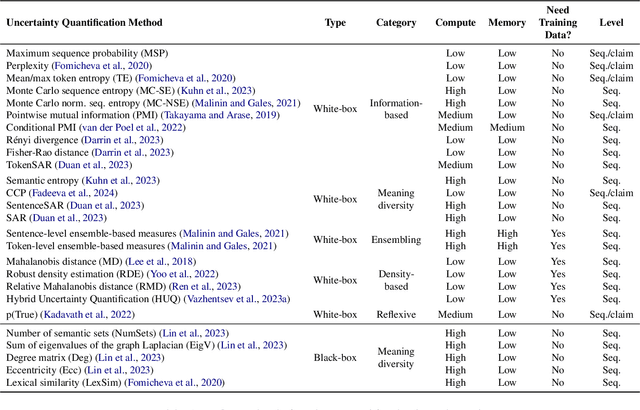
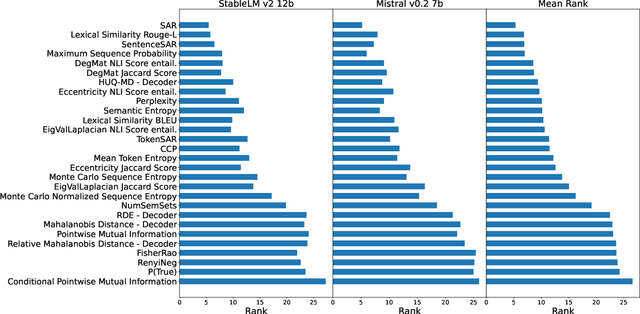
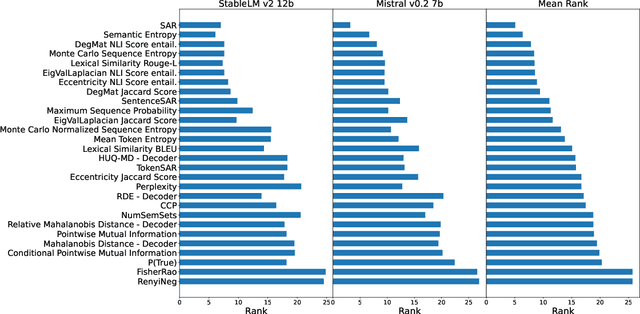
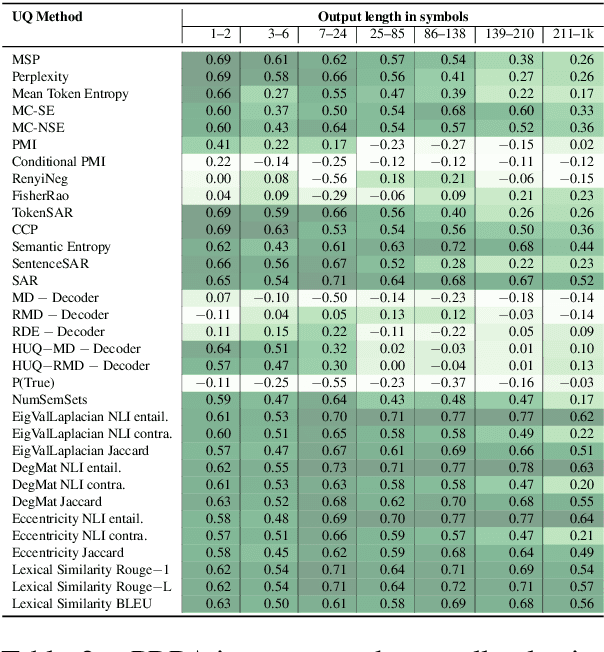
Abstract:Uncertainty quantification (UQ) is becoming increasingly recognized as a critical component of applications that rely on machine learning (ML). The rapid proliferation of large language models (LLMs) has stimulated researchers to seek efficient and effective approaches to UQ in text generation tasks, as in addition to their emerging capabilities, these models have introduced new challenges for building safe applications. As with other ML models, LLMs are prone to make incorrect predictions, ``hallucinate'' by fabricating claims, or simply generate low-quality output for a given input. UQ is a key element in dealing with these challenges. However research to date on UQ methods for LLMs has been fragmented, with disparate evaluation methods. In this work, we tackle this issue by introducing a novel benchmark that implements a collection of state-of-the-art UQ baselines, and provides an environment for controllable and consistent evaluation of novel techniques by researchers in various text generation tasks. Our benchmark also supports the assessment of confidence normalization methods in terms of their ability to provide interpretable scores. Using our benchmark, we conduct a large-scale empirical investigation of UQ and normalization techniques across nine tasks and shed light on the most promising approaches.
Fact-Checking the Output of Large Language Models via Token-Level Uncertainty Quantification
Mar 07, 2024



Abstract:Large language models (LLMs) are notorious for hallucinating, i.e., producing erroneous claims in their output. Such hallucinations can be dangerous, as occasional factual inaccuracies in the generated text might be obscured by the rest of the output being generally factual, making it extremely hard for the users to spot them. Current services that leverage LLMs usually do not provide any means for detecting unreliable generations. Here, we aim to bridge this gap. In particular, we propose a novel fact-checking and hallucination detection pipeline based on token-level uncertainty quantification. Uncertainty scores leverage information encapsulated in the output of a neural network or its layers to detect unreliable predictions, and we show that they can be used to fact-check the atomic claims in the LLM output. Moreover, we present a novel token-level uncertainty quantification method that removes the impact of uncertainty about what claim to generate on the current step and what surface form to use. Our method Claim Conditioned Probability (CCP) measures only the uncertainty of particular claim value expressed by the model. Experiments on the task of biography generation demonstrate strong improvements for CCP compared to the baselines for six different LLMs and three languages. Human evaluation reveals that the fact-checking pipeline based on uncertainty quantification is competitive with a fact-checking tool that leverages external knowledge.
LM-Polygraph: Uncertainty Estimation for Language Models
Nov 13, 2023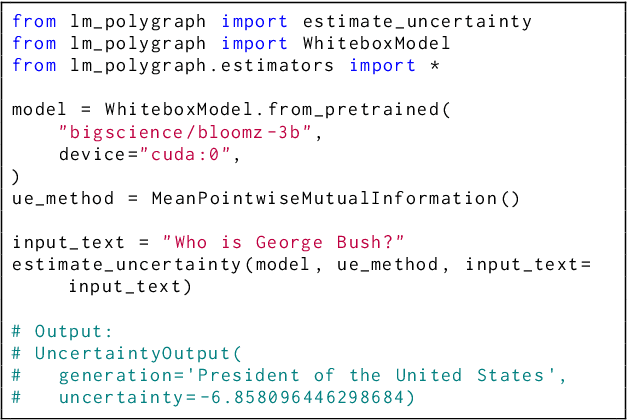
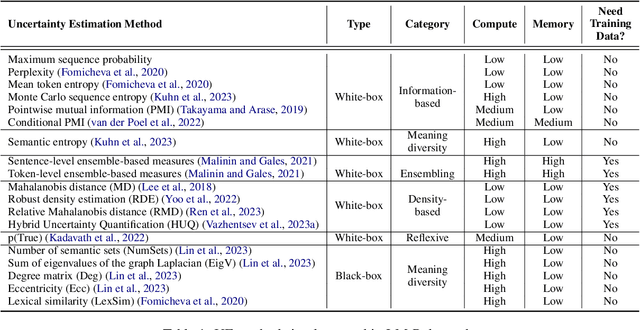
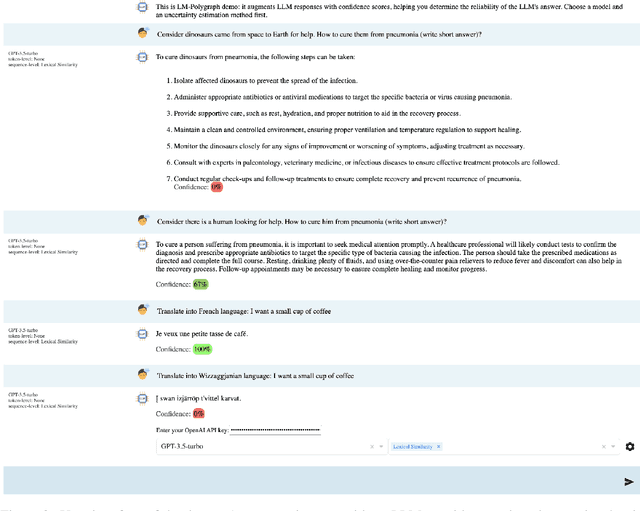
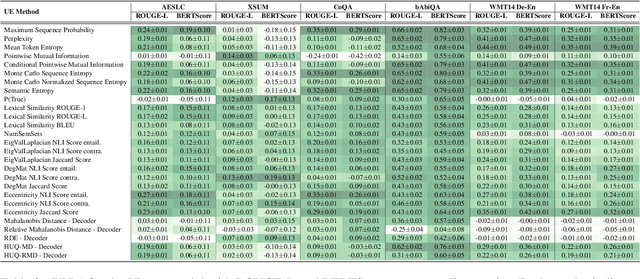
Abstract:Recent advancements in the capabilities of large language models (LLMs) have paved the way for a myriad of groundbreaking applications in various fields. However, a significant challenge arises as these models often "hallucinate", i.e., fabricate facts without providing users an apparent means to discern the veracity of their statements. Uncertainty estimation (UE) methods are one path to safer, more responsible, and more effective use of LLMs. However, to date, research on UE methods for LLMs has been focused primarily on theoretical rather than engineering contributions. In this work, we tackle this issue by introducing LM-Polygraph, a framework with implementations of a battery of state-of-the-art UE methods for LLMs in text generation tasks, with unified program interfaces in Python. Additionally, it introduces an extendable benchmark for consistent evaluation of UE techniques by researchers, and a demo web application that enriches the standard chat dialog with confidence scores, empowering end-users to discern unreliable responses. LM-Polygraph is compatible with the most recent LLMs, including BLOOMz, LLaMA-2, ChatGPT, and GPT-4, and is designed to support future releases of similarly-styled LMs.
 Add to Chrome
Add to Chrome Add to Firefox
Add to Firefox Add to Edge
Add to Edge